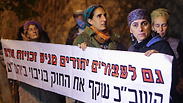
It’s all by the book
Op-ed: The fact that something is legal doesn’t make it justified; sometimes, the fact that something is legal serves only to illustrate the bankruptcy of the legislative mechanisms in a place where criminal acts have become lawful.
The prime minister is right. The prevention of meetings with an attorney and the use of "special interrogation measures" - which reportedly included sleep deprivation, painful binding or restraints, and protracted interrogation sessions, particularly of minors - were indeed undertaken in accordance with the law. And with the approval of the attorney general. And that of the Supreme Court justices.
Here is a partial list of some other actions that have been done by the book. And with the approval of the attorney general. And that of the Supreme Court:
Thousands of Palestinians under interrogation by the Israel Security Agency (ISA) have been prevented, lawfully, from meeting with their attorney. The Supreme Court has approved denying meetings with an attorney. The interrogations – which included sleep deprivation, painful binding, appalling conditions of incarceration, and beatings - were also conducted in accordance with the law. And with the approval of Supreme Court justices.

Hundreds of homes have been demolished in order to punish the families of Palestinians who attacked Israelis, and thousands of people have been rendered homeless. The demolitions were executed in accordance with the law. In almost every case the family petitioned Israel’s High Court of Justice (HCJ). With the exceptions of a handful of cases, the justices approved every house demolition.
Thousands of Palestinians have been held in administrative detention for protracted periods without knowing what they are supposed to be guilty of, without any possibility to defend themselves against allegations, and without knowing when they will be released. This is all done in accordance with the law: The military’s OC Central Command signs the detention order; the detainee can appeal the order to the military court and the Supreme Court; the courts approve the detention orders over and over again.
Extensive areas of the West Bank have been - lawfully - designated as "firing zones" by military orders. The people who live in these areas are expelled time and time again and their homes demolished on the grounds that the site is off limits. Residents’ petitions to the HCJ arguing they have lived in the area for years and have nowhere else to go have been rejected.
But what if there’s no appropriate law allowing the government to do what it wants to? The necessary legislation is passed. A case in point: When the government wanted to prevent the possibility of family unification for couples in which an Israeli citizen or resident married a resident of the occupied territories. The Knesset passed a law preventing such unification, which would have allowed the spouse from the occupied territories to live in Israel. An expanded panel of Supreme Court justices rejected a petition challenging the constitutionality of the law.
Given this reality, saying that the suspects’ interrogation is being conducted in accordance with the law and under the supervision of the legal system is far from satisfactory. As we have seen, just because actions in the occupied territories are undertaken in accordance with the law - the Israeli law - does not make them decent or justifiable, since it is possible to enact almost any law.
This is highlighted by the flood of new bills since early October, when attacks against Israelis resumed, proposing such things as: Allowing imprisonment of minors under the age of 14; imposing minimum sentences; the use of evidence from the military courts in civilian courts inside Israel; and so forth.
The question is not whether a given act is undertaken in accordance with a law tailored to meet the legislator’s wishes. The question is whether the action or policy is decent and justifiable.
The fact that something is legal does not make it justified. Sometimes, the fact that something is legal serves only to illustrate the bankruptcy of the legislative mechanisms in a place where criminal acts have become lawful.
Adv. Yael Stein is the director of B'Tselem’s Research Department.










